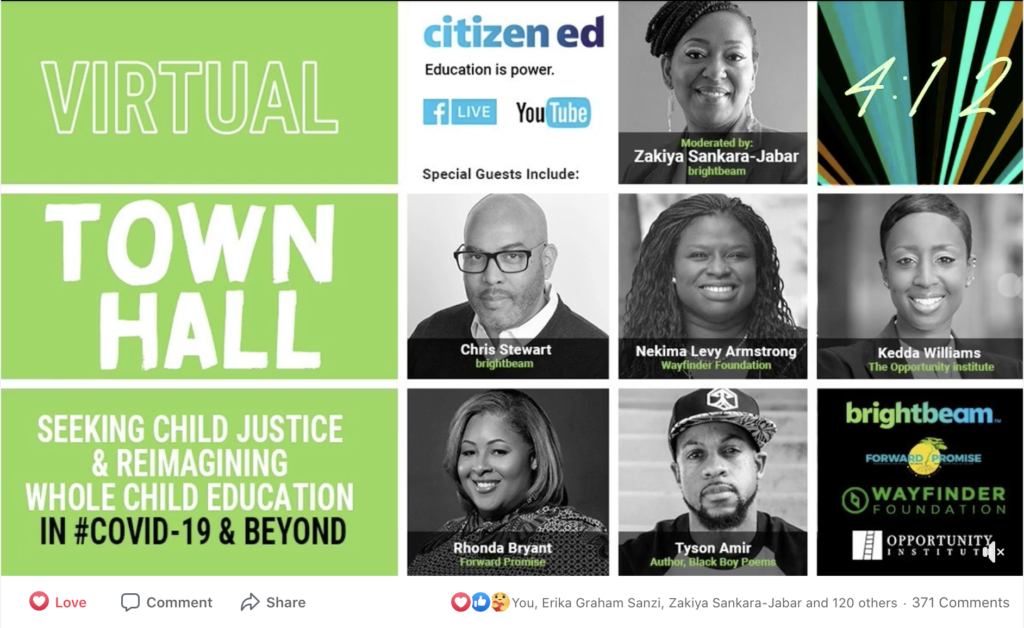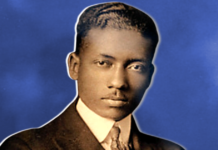
Yesterday, Citizen Education hosted our very first Virtual Town Hall in partnership with our parent organization brightbeam, as well as Forward Promise, the Wayfinder Foundation and the Opportunity Institute, around seeking child justice in the midst of COVID-19, nationwide uprisings following the death of George Floyd, and moving forward.
The virtual town hall, “Seeking Child Justice and Reimagining Whole Child Education in COVID-19 and Beyond,” was guided by Zakiya Sankara-Jabar, brightbeam’s National Director of Activism, and included a guest panel made up of brightbeam CEO Chris Stewart, Wayfinder’s Nekima Levy Armstrong, the Opportunity Institute’s Kedda Williams, Forward Promise’s Rhonda Bryant and “Black Boy Poems” author Tyson Amir.
The two-hour conversation served as a powerful opportunity for this group of Black education activists, advocates and thought leaders to reflect on what it looks like to truly seek child justice and rethink the way we build up the whole child in education.
Here are some highlights from the #SeekingChildJustice Town Hall:
The conversation kicked off with brightbeam CEO Chris “Citizen” Stewart centering the conversation around the historical context of the current protests and push for equality as a reminder that systemic racism runs deep.
He went on to talk about how what’s happening in Minneapolis is not an outlier. In fact, a recent report from brightbeam highlights just how poorly many progressive cities are serving black and brown children.
Connecting the current push for equality, and massive shift to distance learning in the wake of COVID-19, moderator Zakiya Sankara-Jabar shared that an increasing amount of Black families are realizing the value in homeschooling their children.
Civil rights attorney, activist and educational advocate Nekima Levy Pounds drew the comparison between the system of policing and public education in America. The lack of representation and community trust has massive consequences in both sectors.
Poet, emcee, educator, author and creator of ‘Black Boy Poems‘ Tyson Amir spoke on the failure of our public education system to properly represent people of color and teach them in an affirming way.
The town hall then took a moment away from the conversation to watch Amir’s Black Boy Poems curriculum in action:
The Opportunity Institute’s Kedda Williams shared how advocates have been calling out inequitable funding and resource allocation for a long time. The current pandemic is only amplifying these issues as the wealthier districts that can rely on things like property taxes for funding will have an easier time navigating the upheaval.
Forward Promise’s Dr. Rhonda Bryant called out systemic oppression of children outside the dominant (white) culture in schools, and the failure to represent their humanity and culture in schools.
So what can be done? The panelists agreed that tampering at the edges of systems is no longer acceptable. Truly achieving child justice will require an overhaul of a system that has historically failed to serve our most marginalized children. Reform, abolition, revolution or whatever you want to call it will require the centering of the voices of those most affected by this continued systemic failure. Let this conversation serve as a call-to-action to build transformative solutions, that are spawned from a place of revolutionary collaboration to do better for our most vulnerable students.
If you followed along, or even missed the town hall and are looking for more of the resources mentioned throughout, check out this thread from Education Post.










